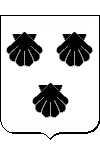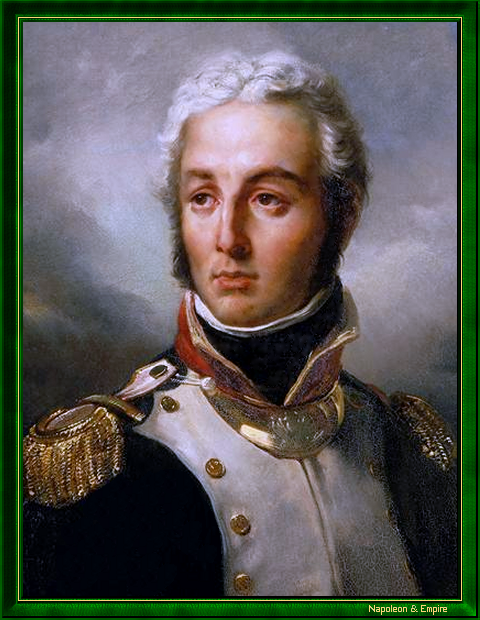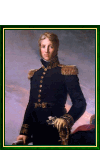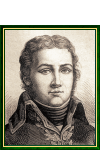Jean Victor Marie Moreau
Pronunciation:

Jean Victor Marie Moreau was born in Morlaix, Brittany (today's Finistère department) on February 14, 1763.
He initially followed in the footsteps of his father, a lawyer, by studying law in Rennes, but events soon led him down an entirely different path.
In 1788, he defended the parliament; in 1789, he became captain of the company of gunners of the National Guard he had just formed in Rennes; in 1791, he was elected lieutenant-colonel of the 1st battalion of Ille-et-Vilaine volunteers.
Having distinguished himself under Charles François Dumouriez at Neerwinden, he was appointed brigadier general on December 20, 1793 (two days before Napoleon Bonaparte). On the following April 12, he became division general. He served under Jean-Charles Pichegru in the Armée du Nord, playing a key role in the conquest of Holland, before replacing his commander on March 3, 1795. In March 1796, he took command of the Rhin-et-Moselle army (succeeding General Louis Charles Antoine Desaix) and entered the campaign against Archduke Charles, whom he defeated at Ettlingen on July 9. Jean-Baptiste Jourdan's defeat at Würtzburg on September 3 forced him to retreat after crossing the Rhine and reaching Munich.
Crossing the Rhine again the following year, he was halted by the preliminary negotiations at Leoben. It was during this campaign that he came across the correspondence of an émigré, Baron de Klinlin, which provided proof of General Pichegru's treachery. Having delayed reporting this to the Directoire, Moreau became a suspect and was forced to resign his command. He then remained unemployed for a year.
After acting as interim commander of the Army of Italy in 1799, he returned to Paris after the Battle of Novi and, on October 22, made the acquaintance of Napoleon Bonaparte.
Although Moreau's popularity within the army had suffered greatly as a result of the defeat at Novi, as well as his procrastination in uncovering evidence of Pichegru's treachery, Napoleon Bonaparte, on the eve of his coup d'état, made a point of rallying this glorious soldier to his cause.
Jean Victor Marie Moreau was compensated for the unrewarding role entrusted to him on 18 Brumaire (arresting and detaining two of the Directors, one of whom he considered a friend) by his appointment as commander-in-chief of the Helvetia and Rhine armies. At their head, energetically supported by Laurent de Gouvion Saint-Cyr (despite their disagreements) and Claude-Jacques Lecourbe, he crossed the Rhine again on April 25, 1800. Munich had fallen into his hands when, following the Battle of Marengo (June 14), an armistice suspended hostilities. His successive renewals earned Moreau four months' inactivity, which he spent in Paris.
Although his jealousy of the First Consul was already evident - General Charles Victor Emmanuel Leclerc, divisional officer in Moreau's army, pointed it out in his correspondence with his brother-in-law Bonaparte - the latter nevertheless sought to attach himself to Moreau by bringing him into his family. But the proposal of an alliance with Hortense de Beauharnais was turned down, all the more vexing as Moreau justified it by considerations that he ignored, shortly afterwards, by marrying a demoiselle Hulot.
By the end of 1800, Moreau was back in the army, and on December 3, thanks in part to General Antoine Richepanse, he won the victory at Hohenlinden. Building on this success, he pursued the Austrians for three weeks, stopping only at the gates of Vienna.
This triumph, soon followed by the signing of the Peace of Lunéville (February 9, 1801), gave Moreau a degree of popularity comparable to that of the First Consul.
But this glory did not protect Moreau from slanderous attacks - quite the contrary. His accounts as commander-in-chief, the purchase of a château by his mother-in-law, the lavish lifestyle the general himself led there after his return from the army - these were all pretexts for perfidious insinuations, some of which may have come from Bonaparte himself.
For his part, Moreau did nothing to mitigate this burgeoning antagonism. Under the influence of his wife and mother-in-law, he even ostentatiously refrained from appearing at the Tuileries, disapproved of the Concordat, mocked the Légion d'honneur and made known his bad feelings towards the First Consul. This attitude soon made him a rallying point for all opponents of the regime, from the republican friends of Jean-Baptiste Bernadotte to the agents of the Comte de Provence, foremost among them Jean-Charles Pichegru.
In early 1804, involved in the conspiracy led by Pichegru and Georges Cadoudal, Moreau was arrested and put on trial. He denied any involvement in the plot, and later admitted only to a few imprudent steps in a letter to Bonaparte. As the charges could not be established and public opinion was in favor of the accused, the judges acquitted him. Napoleon then demanded a second deliberation, which resulted in a two-year prison sentence. The new emperor, furious, commuted this sentence to one of exile.
Jean-Victor Marie Moreau settled in the United States of America, in Morrisville (Pennsylvania), near Trenton (New-Jersey). He spent the next eight years there, keeping in touch with various groups of opponents on all sides.
After the disaster of the French Invasion of Russia, Moreau decided to return to Europe. His plan was to propose to the Tsar that he raise a corps of fifty thousand men from among the prisoners of the Grande Armée, then have them transported by the English navy to the Normandy coast, land at their head and march on Paris to re-establish the Bourbons. Submitted to the Russian embassy in the United States, the plan was approved. On June 21, 1813, Moreau left the USA. On August 17, he was in Prague with Alexander I. The latter rejected the project, but gave the designer a warm welcome.
Moreau, who had drawn up the plans for the 1813-1814 campaign with Bernadotte, was appointed Field Marshal and soon became the Csar's favorite technical advisor. The Russian sovereign was even considering entrusting him with the command-in-chief of the Allied armies when a French cannonball ended the career of the winner of the Battle of Hohenlinden.
Wounded in the knee on August 26 or 27, near Dresden, and amputated, Moreau died of the consequences of his injury on the following September 2 at Lahn in Bohemia. The Tsar had him buried in the crypt of St. Catherine's Catholic Church in St. Petersburg.
"Jean Victor Marie Moreau". Nineteenth Century French school.

Moreau was posthumously appointed Marshal by Louis XVIII.
Moreau's name is inscribed on the 13th column (east pillar) of the Arc de Triomphe de l'Étoile .
Address
20, Rue de la Chaussée d'Antin. Paris IXème arrondissement
This hotel, formerly the property of Joseph Lakanal, belonged to Jean Victor Marie Moreau from February 1799 to July 1802.Other portraits

"Jean Victor Marie Moreau" by Jacques Luc Barbier-Walbonne (Nîmes 1769 - Passy 1860) after François Pascal Simon Gérard (Rome 1770 - Paris 1837).

"Jean Victor Marie Moreau". Nineteenth Century engraving.